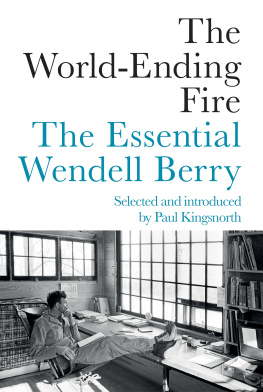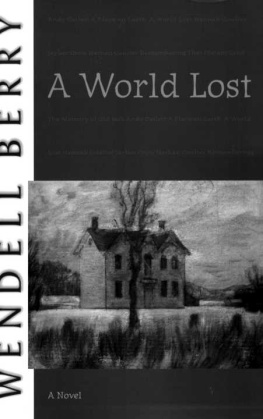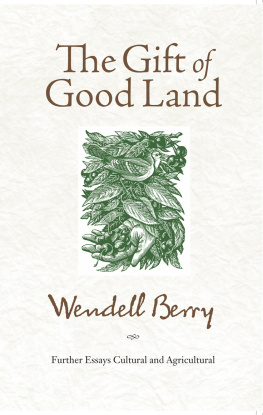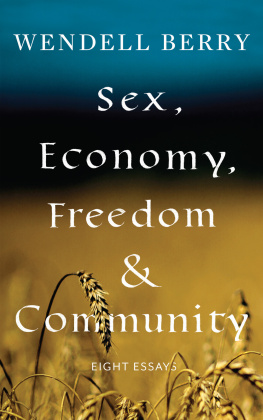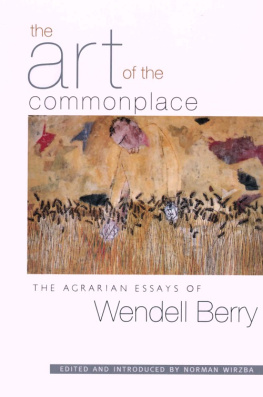THE UNSETTLING OF AMERICA

Copyright 1977 Wendell Berry
Afterword 1996
All rights reserved under International and Pan-American Copyright Conventions.
No part of this book may be used or reproduced in any manner whatsoever without written permission from the publisher, except in the case of brief quotations embodied in critical articles and reviews.
First Counterpoint edition 2015
Library of Congress Cataloging-in-Publication Data
Berry, Wendell 1934-
The Unsettling of America.
1. AgricultureEconomic aspectsUnited States.
2. AgricultureSocial aspectsUnited States.
I. Title
HD1761.B47338.1'097377-3729
Interior design by David Bullen
Cover design by Debbie Berne
Counterpoint Press
2560 Ninth Street, Suite 318
Berkeley, CA 94710
www.counterpointpress.com
Distributed by Publishers Group West
10 9 8 7 6 5 4 3 2 1
e-book ISBN 978-1-61902-696-4
For Maurice Telleen
Contents
This book was meant to be a criticism of what I have called modern or orthodox agriculture. As I now realize, it is more a review than a criticism. Criticism requires a subject that is finished. When agriculture is finished, no would-be critic will be available. I am therefore constrained to accept my demotion as a privilege.
Nevertheless, there is a difficulty in writing a book on so inherently topical a subject as agricultural policy, and this difficulty is time: events that were the immediate cause of the book may be finished before the writing is. No reader of this book can fail to observe that it deals at length with the assumptions and policies of former Secretary of Agriculture Earl L. Butz, though Mr. Butz and the administration he served are now out of office.
I can only insist that my book is not for that reason out-of-date. Secretary Butzs tenure in the Department of Agriculture, and even his influence, are matters far more transient than the power and the values of those whose interests he represented. Moreover, the cultural issues that I attempt to deal with have been with us since our history began, and, barring miracle or catastrophe, they will be with us for a long time to come.
As a matter of fact, this books origins go back farther than the secretaryship of Mr. Butz. The first notes I made for it were incited by a news story in the summer of 1967 on the report of President Johnsons special commission on federal food and fiber policies.
The commission said, according to an article in the Louisville Courier-Journal, that the countrys biggest farm problem was a surplus of farmers:... the technological advances in agriculture have so greatly reduced the need for manpower that too many people are trying to live on a national farm income wholly inadequate for them. The proposed solutions were to find better opportunities for the farm people, a more comprehensive national employment policy, retraining programs, improved general educational facilities, etc. Both the commission and the writer of the article had obviously taken for granted that the lives and communities of small farmers then still on the farmand those of the 25 million who had left the farm since 1940were of less value than technological advances in agriculture. There seemed also to be no official doubt that adequate solutions were to be found in government-supplied opportunities, facilities, and programs. Reading that article, I realized that my values were not only out of fashion, but under powerful attack. I saw that I was a member of a threatened minority. That is what set me off.
W.B.
When I was working on this bookfrom 1974 to 1977the long agricultural decline that it deals with was momentarily disguised as a boom. The big farmers were getting bigger with the help of inflated land prices and borrowed money, and the foreign demand for American farm products was strong, so from the official point of view the situation looked good. The big were supposed to get bigger. Foreigners were supposed to be in need of our products. The official point of view, foreshortened as usual by statistics, superstitious theory, and wishful prediction, was utterly complacent. Then Secretary of Agriculture Earl L. Butz issued the most optimistic, the most widely obeyed, and the worst advice ever given to farmers: that they should plow fencerow to fencerow.
That the situation was not goodfor farms or farmers or rural communities or nature or the general publicwas even then evident to any experienced observer who would turn aside from the preconceptions of agribusiness and look at the marks of deterioration that were plainly visible. And now, almost a decade later, it is evident to everyone that, at least for farmers and rural communities, the situation is catastrophic: Farmers are losing their farms, some are killing themselves, some in the madness of despair are killing other people, and rural economy and rural life are gravely stricken. The agricultural economists chart the liquidations of assets, the shakeouts, and the downturns, apparently amazed that now even the large progressive and efficient farmers are in trouble.
But this is not just a financial crisis for country people. Critical questions are being asked of our whole society: Are we, or are we not, going to take proper care of our land, our country? And do we, or do we not, believe in a democratic distribution of usable property? At present, these questions are being answered in the negative. Our soil erosion rates are worse now than during the years of the Dust Bowl. In the arid lands of the West, we are overusing and wasting the supplies of water. Toxic pollution from agricultural chemicals is a growing problem. We are closer every day to the final destruction of private ownership not only of small family farms, but of small usable properties of all kinds. Every problem I dealt with in this book, in fact, has grown worse since the book was written.
The one improvement has been in public concern about the problems. Among farmers there is growing distrust of the agribusiness line of talk and growing interest in agricultural health and sanity. Among city people there is a growing awareness that sane and healthy agriculture requires an informed urban constituency. There is hope in these developments and in the continued existence of a remnant of excellent small farms and farmers.
Some prominent agricultural economists are still finding it possible to pretend that the only issues involved are economic, but that possibility is diminishing. I recently attended a meeting at which an agricultural economist argued that there is no essential difference between owning and renting a farm. A farmer stood up in the audience and replied: Professor, I dont think our ancestors came to America in order to rent a farm.
Nough said.
W.B.
March 1986
Anything that I will ever have to say on the subject of agriculture can be little more than a continuation of talk begun in childhood with my father and with my late friend Owen Flood. Their conversation, first listened to and then joined, was my first and longest and finest instruction. From them, before I knew I was being taught, I learned to think of the meanings, the responsibilities, and the pleasures of farming.
Next page

